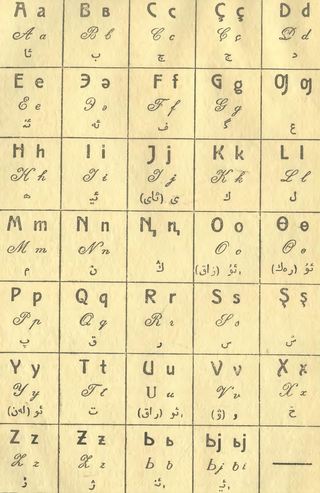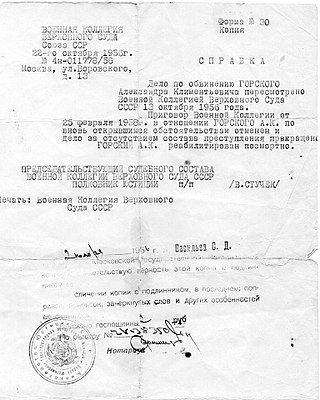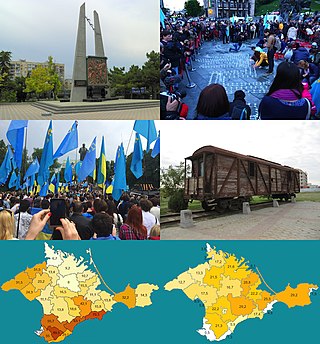The First Secretary of the Tatarstan regional branch of the Communist Party of the Soviet Union was the position of highest authority in the Tatar ASSR in the Russian SFSR of the Soviet Union. The position was created in 1920, and abolished in August 1991. The First Secretary was a de facto appointed position usually by the Politburo or the General Secretary himself.
| Name | Term of Office | Life years | |
|---|---|---|---|
| Start | End | ||
| First Secretaries of the Communist Party | |||
| Semyon Kanatchikov | 1920 | 1920 | |
| Aleksandr Tanyayev | August 1920 | December 1920 | 1898–1974 |
| Dmitry Orlov | December 1920 | January 1921 | 1894–1974 |
| Karl Fige | January 1921 | March 1921 | 1897–1938 |
| Nikolay Baryshev | March 1921 | June 1921 | 1898–1937 |
| Aleksandr Karpov | June 1921 | December 1921 | 1896–1937 |
| Aleksey Galaktionov | December 1921 | June 5, 1922 | 1888–1922 |
| Dmitry Zhivov | June 1922 | November 1923 | 1896–1939 |
| Boris Pinson | November 1923 | January 1924 | 1892–1936 |
| Ivan Bazhanov | January 1924 | March 1924 | 1896–1938 |
| Ivan Morozov | March 1924 | November 5, 1925 | 1889–1957 |
| Mendel Khatayevich | November 5, 1925 | June 7, 1928 | 1893–1939 |
| Mikhail Razumov | June 7, 1928 | October 1933 | 1894–1937 |
| Alfred Lepa | October 1933 | July 1937 | 1896–1937 |
| Aleksandr Alemasov [lower-alpha 1] | August 26, 1937 | March 9, 1942 | 1902–1972 |
| Anatoly Kolybanov | March 9, 1942 | July 8, 1943 | 1905–1978 |
| Vladimir Nikitin | July 8, 1943 | December 28, 1944 | 1907–1959 |
| Zinnyat Muratov | December 28, 1944 | June 6, 1957 | 1905–1988 |
| Semyon Ignatyev | June 6, 1957 | October 28, 1960 | 1904–1983 |
| Fikryat Tabyev | October 28, 1960 | November 2, 1979 | 1928–2015 |
| Rashid Musin | November 2, 1979 | October 2, 1982 | 1921–1982 |
| Gumer Usmanov | October 29, 1982 | September 23, 1989 | 1932–2015 |
| Mintimer Shaimiev | September 23, 1989 | August 30, 1990 | 1937– |
| Revo Idiatullin | September 1990 | August 1991 | 1938– |

Russification, or Russianization, is a form of cultural assimilation in which non-Russians, whether involuntarily or voluntarily, give up their culture and language in favor of the Russian culture and the Russian language.

Musa Cälil was a Soviet–Tatar poet and resistance fighter. He is the only poet of the Soviet Union awarded simultaneously the Hero of the Soviet Union award for his resistance fighting and the Lenin Prize for having written The Moabit Notebooks; both awards were bestowed upon him posthumously.

The Tatar Autonomous Soviet Socialist Republic, abbreviated as Tatar ASSR or TASSR (1920–1990), was an autonomous republic of the Russian SFSR. The resolution for its creation was signed on 27 May 1920 and the republic was proclaimed on 25 June 1920. Kazan served as its capital.

Crimean Tatars or Crimeans are a Turkic ethnic group and nation who are an indigenous people of Crimea. The formation and ethnogenesis of Crimean Tatars occurred during the 13th–17th centuries, uniting Cumans, who appeared in Crimea in the 10th century, with other peoples who had inhabited Crimea since ancient times and gradually underwent Tatarization, including Greeks, Italians, Armenians, Goths, Sarmatians, and others.

Jaꞑalif, Yangalif or Yañalif is the first Latin alphabet used during the latinisation in the Soviet Union in the 1930s for the Turkic languages. It replaced the Yaña imlâ Arabic script-based alphabet in 1928, and was replaced by the Cyrillic alphabet in 1938–1940. After their respective independence in 1991, several former Soviet states in Central Asia switched back to Latin script, with slight modifications to the original Jaꞑalif.

Rehabilitation was a term used in the context of the former Soviet Union and the post-Soviet states. Beginning after the death of Stalin in 1953, the government undertook the political and social restoration, or political rehabilitation, of persons who had been repressed and criminally prosecuted without due basis. It restored the person to the state of acquittal. In many cases, rehabilitation was posthumous, as thousands of victims had been executed or died in labor camps.
Semyon Denisovich Ignatiev was a Soviet politician, and the last head of the security forces appointed by Joseph Stalin.

The Mari Autonomous Soviet Socialist Republic was an autonomous republic of the Russian SFSR, succeeding the Mari Autonomous Oblast. When the Soviet Union disintegrated, the Mari ASSR became the Mari El Republic, a federal subject of the Russian Federation.

The transfer of the Crimean oblast in the Soviet Union in 1954 was an administrative action of the Presidium of the Supreme Soviet that transferred the government of Crimea from the Russian SFSR to the Ukrainian SSR.

After it was established on most of the territory of the Russian Empire, the Soviet Union remained the world's largest country until it collapsed in 1991. It covered a large part of Eastern Europe while also spanning the entirety of the Caucasus, Central Asia, and Northern Asia. During this time, Islam was the country's second-largest religion; 90% of Muslims in the Soviet Union were adherents of Sunni Islam, with only around 10% adhering to Shia Islam. Excluding the Azerbaijan SSR, which had a Shia-majority population, all of the Muslim-majority Union Republics had Sunni-majority populations. In total, six Union Republics had Muslim-majority populations: the Azerbaijan SSR, the Kazakh SSR, the Kyrgyz SSR, the Tajik SSR, the Turkmen SSR, and the Uzbek SSR. There was also a large Muslim population across Volga–Ural and in the northern Caucasian regions of the Russian SFSR. Across Siberia, Muslims accounted for a significant proportion of the population, predominantly through the presence of Tatars.
The Union of Russian Composers is a state-created organization for musicians and musicologists created in 1932 by Joseph Stalin in the last year of the Cultural Revolution and first Five-Year Plan. It became the official replacement for the various artistic associations which were present before like the Association for Contemporary Music and the Russian Association of Proletarian Musicians, two of the independently directed, music committees. According to Richard Taruskin, the Union had fully materialized into its full-form well before 1948 and in time for the delivery of Zhdanov's Doctrine.

Öçpoçmaq is a Tatar and Bashkir national dish, an essential food in Tatar and Bashkir culture. It is a triangular pastry, filled with chopped meat, onion and potatoes. Öçpoçmaq is usually eaten with bouillon or with tea.

A continuous presence of Islam in Belarus began in the 14th century. From this time it was primarily associated with the Lipka Tatars, many of whom settled in the Polish–Lithuanian Commonwealth while continuing their traditions and religious beliefs. With the advent of the Soviet Union, many Muslims left Belarus for other countries, particularly Poland. Presently, the Belarusian Muslim community consists of remaining Lipka Tatars, as well as recent immigrants from the Middle East. As of 2007, there are 45,000 Muslims in Belarus, representing 0.5% of the total population.

The deportation of the Crimean Tatars or the Sürgünlik ('exile') was the ethnic cleansing and cultural genocide of at least 191,044 Crimean Tatars carried out by the Soviet authorities from 18 to 20 May 1944, which was supervised by Lavrentiy Beria, head of Soviet state security and the secret police, and which was ordered by the Soviet leader Joseph Stalin. Within those three days, the NKVD used cattle trains to deport mostly women, children, and the elderly, even Communist Party members and Red Army members, to mostly the Uzbek SSR, several thousand kilometres away. They were one of the several ethnicities who were subjected to Stalin's policy of population transfer in the Soviet Union.
The following lists events that happened during 1944 in the Union of Soviet Socialist Republics.

Ildar Irekovich Gilmutdinov is a deputy for the United Russia party in the 7th State Duma of the Russian Federation. He is the head of the committee for nationalities. Chairman of the Council of the Federal National and Cultural Autonomy of the Tatars. Gilmutdinov received international sanctions in 2022 for his support of the Russian invasion of Ukraine.
The following lists events that happened during 1990 in the Union of Soviet Socialist Republics.

Seit Memetovich Tairov was the highest-ranking Crimean Tatar politician in Soviet Union after the Sürgün, having risen to prominence as a leader in Akkurgan and then first secretary of the Jizzakh regional committee of the Communist Party. A controversial figure among Crimean Tatars today, he is remembered for his staunch opposition to full right of return to Crimea. As a public supporter of "taking root" in Uzbekistan, he was one of the top signatories of the notorious "Letter of Seventeen" in March 1968 that downplayed Crimean Tatar struggles and discrimination in exile and urged Crimean Tatars to avoid "succumbing" to desires to return to Crimea.

Mustafa Veisovich Selimov was a Crimean Tatar communist leader, partisan, and civil rights activist. Having been the First Secretary of the Yalta Communist Party before the war, he served as the commissar of a partisan formation during the war before being exiled the Uzbek SSR as a Crimean Tatar, where he went on to hold leadership positions in the Ministry of Agriculture of the Uzbek SSR and become one of the original organizers of the Crimean Tatar civil rights movement, for which he received reprimand from party organs.